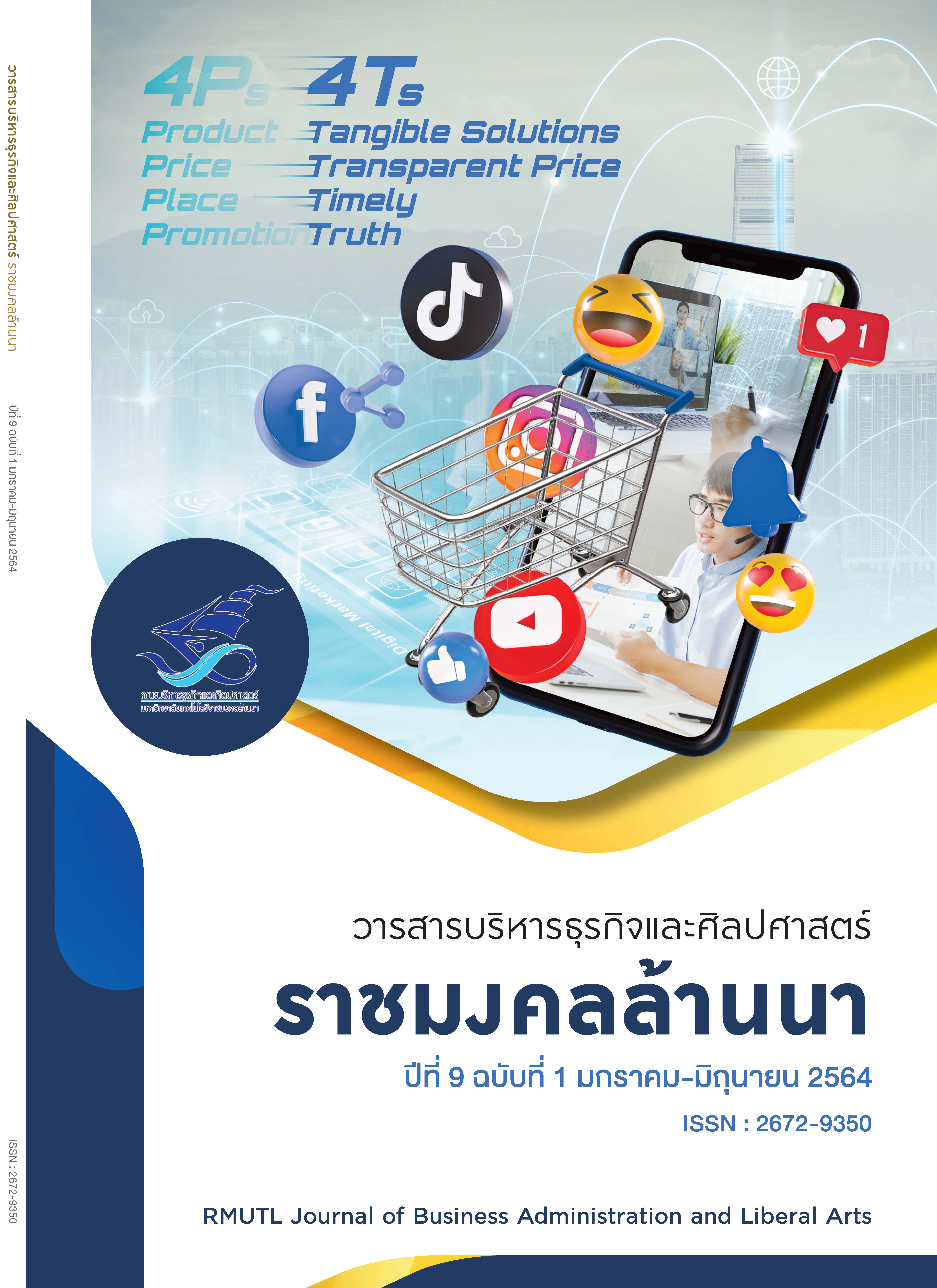The Communications Crisis in Condition of the New Corona Virus Effected :The Role in Buddhism
Main Article Content
Abstract
“Critical Communication” is an essential communication tool. For source messengers that need to be adapted and applied to mitigate the risk in business organizations and services, of their own and relieve anxiety for receivers, Which are the means of communicating in a critical state? As well as how Buddhism plays a role in addressing the crisis communication with the "New Corona Virus (Covid 19)" as the objective. This will cause a slowdown that affects many sectors such as the impact on the world tourism sector to Thailand. Impact on the education sector. Impact on the social sector in various dimensions, as well as opportunities for access to assistance and welfare from the state, where all affected sectors should be subsidized and supported. The guidelines for dealing with the crisis communication on the impact of the new virus covid 19 in various aspects, as a whole should be provided such as risk assessment and planning, the establishment of a special operation center production of media, materials and equipment for protection and maintenance, and education, communication, dissemination and examination, and the role of Buddhism in dealing with crisis communication with 10 beliefs (Kalama Sutra), negligence, consciousness (patience), the dependence of the noble truths 4, Itt Baht 4, Self-Reliance, 10 Principles of an honest man and Unwholesome 10 Principles of an honest man in communicating in the crisis of the impact of the new virus covid 19 to be better, to have a world or justice to protect the world. It is a principle that helps every human being in the world. Living happily, generous, and doing good things. It consists of two principles: Moral Shame and Moral Dread.
Article Details
บทความวิจัยนี้เป็นของลิขสิทธิ์
References
กรมอนามัย. (2564). แนะแนวทางศูนย์เด็กเล็กตามมาตรการป้องกันโรคโควิด-19 เพื่อความปลอดภัยและสุขอนามัยที่ดี. สืบค้น 22 กุมภาพันธ์ 2564, จาก https://www.hfocus.org/content/2020/ 06/19476
กรุงเทพธุรกิจ. (2563). ภาพรวมผลกระทบจากการแพร่ระบาดของโควิด19. สืบค้น 12 มกราคม 2564, จาก https://www.bangkokbiznews.com/2563
ธนาคารแห่งประเทศไทย (ธปท.). (2564). บทสรุปเศรษฐกิจของไทยต่อสถานการณ์โควิด-19. กรุงเทพฯ: วังขุนพรหม.
__________. (2564). บทสรุปเศรษฐกิจไทยต่อสถานการณ์โควิด-19. สืบค้น 22 กุมภาพันธ์ 2564, จาก https://www.bot.or.th/Thai/Pages/default.aspx
พระธรรมปิฎก (ป.อ. ปยุตฺโต). (2545). หลักพุทธธรรม. กรุงเทพฯ: โรงพิมพ์มหาจุฬาลงกรณราชวิทยาลัย.
พระพรหมคุณาภรณ์ (ป.อ. ปยุตฺโต). (2551). พจนานุกรมพุทธศาสน์ ฉบับประมวลศัพท์. กรุงเทพฯ: เอส.อาร์. พริ้นติ้งแมสโปรดักส์.
พระไพศาลวิสาโล. (2549). การช่วยเหลือด้วยวิธีแบบพุทธ. กรุงเทพฯ: เครือข่ายพุทธิกา.
มหาจุฬาลงกรณราชวิทยาลัย. (2539). พระไตรปิฎกภาษาไทย ฉบับมหาจุฬาลงกรณราชวิทยาลัย. กรุงเทพฯ: โรงพิมพ์มหาจุฬาลงกรณราชวิทยาลัย.
การพึ่งพาตนเอง; (พระไตรปิฎก. ขุ.ธ. (ไทย) [สุตฺตนฺตปิฏก/ขุทฺทกนิกาย/ธมฺมปท] เล่ม 25/ข้อ 160/หน้า 86)
การพึ่งพาตนเอง; (พระไตรปิฎก. ขุ.ธ. (ไทย) [สุตฺตนฺตปิฏก/ขุทฺทกนิกาย/ธมฺมปท] เล่ม 25/ข้อ 25/หน้า 36, 66)
การมีสติ; (พระไตรปิฎก. องฺ.ติก. (ไทย) [สุตฺตนฺตปิฏก/องฺคุตฺตรนิกาย/ติกนิปาต] เล่ม 20/ข้อ 12/หน้า 505)
กุศลกรรมบท 10; (พระไตรปิฎก. ที.ปา. (ไทย) [สุตฺตนฺตปิฏก/ทีฆนิกาย/ปาฏิกวคฺค] เล่ม 34/ข้อ 84/หน้า 34)
ความไม่ประมาท; (พระไตรปิฎก. ขุ.ขุ. (ไทย) [สุตฺตนฺตปิฏก/ขุทฺทกนิกาย/ขุทฺทกปาฐฺ] เล่ม 4/ข้อ 42/หน้า 510)
ความไม่ประมาท; (พระไตรปิฎก. ขุ.ขุ. (ไทย) [สุตฺตนฺตปิฏก/ขุทฺทกนิกาย/ขุทฺทกปาฐฺ] เล่ม 17/ข้อ 117/หน้า 128)
ความอดทน; (พระไตรปิฎก. ที.ปา. (ไทย) [สุตฺตนฺตปิฏก/ทีฆนิกาย/ปาฏิกวคฺค] เล่ม 11/ข้อ 13/หน้า 254)
หลักโลกบาล “หิริโอตตัปปะ”; (พระไตรปิฎก. องฺ.อฏฺฐฺก. (ไทย) [สุตฺตนฺตปิฏก/องฺคุตฺตรนิกาย/อฏฺฐฺกนิปาต] เล่ม 23/ข้อ 14/หน้า 64)
อริยสัจ 4; (พระไตรปิฎก. องฺ.อฏฺฐก. (ไทย) [สุตฺตนฺตปิฏก/องฺคุตฺตรนิกาย/อฏฺฐฺกนิปาต] เล่ม 23/ข้อ 102/หน้า 190)
อิทธิบาท 4; (พระไตรปิฎก. ม.ม. (ไทย) [สุตฺตนฺตปิฏก/มชฺฌิมนิกาย/มชฺฌิมปณฺณาสก] เล่ม 13/ข้อ 247/หน้า 292)
หมายเหตุ: (การแปลความว่า ชื่อย่อคัมภีร์ในพระไตรปิฎกมี 3 ตอน คือ เลขเล่ม/เลขข้อ/เลขหน้า เช่น องฺ.ปญฺจก. (ไทย) 22/174/228–229 หมายถึง พระไตรปิฎก (ภาษาไทย) หมวดพระสุตตันตปิฏกองฺคุตฺตรนิกาย ปญฺจกนิบาต เล่มที่ 22 ข้อที่ 174 หน้าที่ 228–229 เป็นต้น)
สำนักงานคณะกรรมการส่งเสริมวิทยาศาสตร์ วิจัยและนวัตกรรม (สกสว.). (2563). ผลกระทบทางสังคมของการระบาดโรคโควิด-19 ระลอกใหม่และมาตรการที่ควรมี. สืบค้น 22 กุมภาพันธ์ 2564, จาก https://tdri.or.th/2021/01/impact-of-new-covid-19-wave
__________. (2563). สรุปรายงานผลกระทบจากการแพร่ระบาดของโควิด-19 สู่ภาคประชาสังคมของไทย. สืบค้น 12 มกราคม 2564, จาก https://www.egov.go.th/th/government-agency/2564
อีโคโนมิสต์ อินเทลลิเจนซ์ ยูนิต (อีไอยู). (2021). สรุปภาพรวมสภาวะเศรษฐกิจจากเชื้อไวรัสโคโรนา 2009. กรุงเทพฯ: อินเทลลิเจนซ์ ยูนิต.
__________. (2021). COVID-19 in Thailand. สืบค้น 22 กุมภาพันธ์ 2564, จาก https://www.econo mistintelligenceunit.com
BBC World Thailand (บีบีซี เวิลด์เซอร์วิส). โควิด-19: ผลสำรวจชี้วิกฤตไวรัสโคโรนากระทบประเทศยากจนและคนหนุ่มสาวมากที่สุด. สืบค้น 22 กุมภาพันธ์ 2564, จาก https://www.bbc.com/thai/ thailand-54115739
Fleishman Hillard Thailand. 5 วัคซีนการสื่อสารในภาวะวิกฤต สู้สถานการณ์การแพร่ระบาดโรคโคโรนาไวรัส (COVID-19). สืบค้น 22 กุมภาพันธ์ 2564, จาก https://fleishmanhillard.co.th/2020/04
Slaikeu, K. A. (1984). Crisis Intervention. MA: Allyn & Bacon.
Ulmer, S. and Seeger, M. W. (2007). Effective Crisis Communication Moving from Crisis to Opportunity. California: Sage.
World Health Organization. (n.d.). Coronavirus Disease (COVID-19) Outbreak. Retrieved May 21, 2020, from https://www.who.int.org
__________. (n.d.). Coronavirus Disease 2019 (COVID-19): Centers for Disease Control and Prevention (in English). Retrieved May 22, 2020, from https://www.who.int.org

